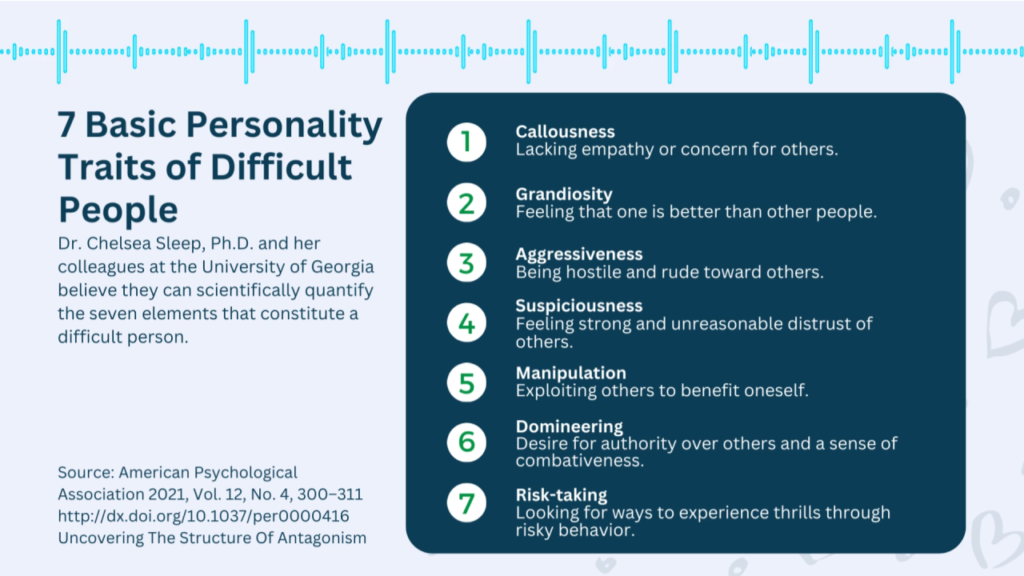
As a residential property manager, dealing with difficult people can be a challenging and stressful part of your job. Whether it’s a resident who constantly complains or a property owner who is demanding and unreasonable, navigating difficult personalities requires a delicate balance of diplomacy, assertiveness, and patience. Failure to effectively manage difficult people can lead to conflicts, unhappy residents, and potential legal issues. In this article, we will explore practical strategies for dealing with difficult people in the residential property management profession, including identifying personality traits of difficult people, developing communication skills, and self-reflection. With the right tools and mindset, you can successfully navigate challenging situations and maintain positive relationships with all parties involved.
- Identifying the seven personality traits of difficult people
- Developing communication skills
- Self-Reflection
Identifying the seven personality traits of difficult people
When preparing for the first episode of Ready, Set…Respond: “Make Love Not War – True and tested advice for responding to difficult people,“ I did a little digging to see what research was available on identifying what makes a person difficult. Most published research focused on extreme personality disorders, but being difficult isn’t necessarily a severe disorder. In fact, being difficult can be a temporary condition we all suffer from every once in a while, in varying degrees of intensity, which is precisely what Dr. Chelsea Sleep and a team of researchers out of the University of Georgia discovered. They now believe they can scientifically quantify the seven elements that make a person difficult. Those elements are:
- Callousness: Lacking empathy or concern for others.
- Grandiosity: Feeling that one is better than other people.
- Aggressiveness: Being hostile and rude toward others.
- Suspiciousness: Feeling strong and unreasonable distrust of others.
- Manipulation: Exploiting others to benefit oneself.
- Domineering: Desire for authority over others and a sense of combativeness.
- Risk-taking: Looking for ways to experience thrills through risky behavior.

Knowing these seven traits can be extremely helpful when dealing with challenging individuals in any context, including residential property management. By understanding these traits, property managers can better recognize difficult personalities and develop effective strategies to manage them.
For example, if a resident displays aggressive behavior, a property manager can approach them calmly, speak in a non-confrontational manner, and listen actively to their concerns. If a property owner exhibits grandiose tendencies, a manager can acknowledge their feelings of importance while gently redirecting their focus to the issue at hand.
Developing communication skills
When addressing difficult people, it is essential to start with respect, practice active listening, communicate next steps, and follow up.
Start with respect: When dealing with difficult people, starting the conversation with respect is imperative. This means being polite and courteous, even if the other person is not. It also means acknowledging their perspectives and feelings, even if you disagree. Starting the conversation with respect sets a positive tone and can help de-escalate any tension.
Practice active listening: Active listening involves fully focusing on the person speaking and seeking to understand their perspective without interrupting or judging. When dealing with difficult people, it is especially important to listen actively, as it can help to diffuse their anger or frustration. Additionally, active listening can help identify the root cause of the problem, which can then be addressed constructively.
Communicate next steps: After actively listening and understanding the other person’s perspective, it is important to communicate next steps. This involves verbalizing the steps that will be taken to address the issue and setting realistic expectations for what can be achieved. It is also important to be clear about what actions the other person needs to take, if any, to resolve the issue.
Follow up: Following up is an important part of managing difficult people. It involves checking in with the other person to ensure that the issue has been resolved to their satisfaction and to address any outstanding concerns or issues. It is important to follow up promptly, as this demonstrates a commitment to resolving the issue, and can help build trust.
By starting with respect, practicing active listening, communicating next steps, and following up, property managers can effectively manage difficult people and resolve conflicts in a constructive manner. These strategies can help to maintain positive relationships with residents and property owners and create a more harmonious living environment for all involved.
Self-Reflection
Any time we go as far as to judge others, it’s always a best practice to turn that mirror around and take a close look at ourselves. In the spirit of self-reflection, knowing if you are a difficult person can also be beneficial. Firstly, self-reflection can help you identify your behavior patterns, including any traits that may contribute to difficult interactions with others. By acknowledging and addressing these patterns, you can work towards improving your interpersonal skills and avoid potential conflicts.
Secondly, acknowledging and working on your own difficult tendencies can help you become more effective at managing difficult personalities in others. By understanding your strengths and limitations, you can approach difficult situations more confidently and assertively while maintaining a collaborative and respectful tone.
Our friends over at IDR labs created a free 35-question test based on Sleep’s research that aims to score you on the seven traits that underpin antagonism and give you an idea of how hard it is for others to get along with you. Often, we may find that those around us are simply reacting to our behavior, and close self-evolution can only lead to discovery and personal growth. Take the self-assessment and feel free to share your results!




